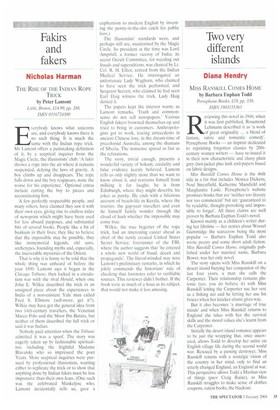Two very different islands
Diana Hendry
MISS RANSKILL COMES HOME by Barbara Euphan Todd Persephone Books, 170, pp. 330, ISBN 1903155363 Reviewirig this novel in 1946, when it was first published, Rosamond Lehmann described it as 'a work of great originality ... a blend of fantasy. satire and romantic comedy'. Persephone Books — an imprint dedicated to reprinting forgotten classics by 20thcentury women writers — have re-issued it in their now characteristic and classy plain grey dust-jacket plus lush end-papers based on fabric designs.
Miss Ranskill Comes Home is the 46th title in a list that includes Monica Dickens, Noel Streatfield, Katherine Mansfield and Marghanita Laski. Persephone's website promises books that are 'neither too literary nor too commercial' but are 'guaranteed to be readable, thought-provoking and impossible to forget'. All three claims are well proven by Barbara Euphan Todd's novel.
Known mainly as a children's writer during her lifetime — her stories about Worzel Gummidge the scarecrow being the most popular — Barbara Euphan Todd also wrote poetry and some short adult fiction. Miss Ranskill Comes Home, originally published under her married name, Barbara Bower, was her only novel.
The story opens with Miss Ranskill on a desert island burying her companion of the last four years, a man she calls the Carpenter. Their relationship remains platonic (yes, you do believe it) with Miss Ranskill letting the Carpenter use her vest as a fishing net and he letting her use his braces when her knicker elastic gives way.
But it also becomes 'a marriage of true minds' and when Miss Ranskill returns to England she takes with her the survival skills and the moral values she's learnt from the Carpenter.
Initially the desert island romance appears to be just the wrapping that, once uncovered, allows Todd to develop her satire on English village life during the second world war. Rescued by a passing destroyer, Miss Ranskill returns with a nostalgic vision of the country in her mind, only to find an utterly changed England, an England at war. This perspective allows Todd a Martian view of things (pace Craig Raine), as Miss Ranskill struggles to make sense of clothes coupons, ration books, the blackout.
Life on the island with the Carpenter has so changed Miss Ranskill that the pettiness of village life and above all the still rigid class barriers become distressingly painful to her. She finds herself among a people who 'though they had suffered air-raids and mutilations, the destruction of their homes and the death of their kin, yet could not bear to hear oddly-timed laughter or statements of fact beyond their immediate knowledge'. Typical among them is the army major's widow, Mrs Phillips, who has blue blood in her veins and her nose and who among other things believes in the 'flogging of boys', the 'shooting of shirkers', the 'torture of Adolf Hitler' and 'the abolition of hot water bottles'.
Everywhere she goes, Miss Ranskill encounters closed minds and a kind of awful self-righteous patriotism. No one seems able to listen. But ultimately the romantic comedy deepens to give the book its moral core and with a nicely unexpected twist the romance with the Carpenter is 'consummated' in that Miss Ranskill is able to pass love on. It would be unkind of me to tell you how.



























































 Previous page
Previous page